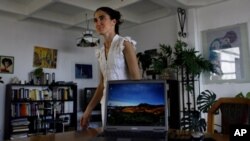As Pope Benedict prepares to visit Cuba next week, a dissident blogger says the trip is a good time to showcase the real situation in the island nation.
Even though Yoani Sánchez believes the visit will not have a major political impact, she says it will be a good opportunity because of the increased international attention that comes with a visit by the pope.
In an exclusive interview with Voice of America, the Cuban blogger said Internet access is still a major problem on the island and explains how she manages to update her blog Generation Y and tweets current events, which has made her famous in the social media world.
VOA: How is the country preparing for Pope Benedict’s visit after several member of the Ladies in White (an opposition movement consisting of wives and female relatives of jailed dissidents) were detained?
Sánchez: For the ‘backyard’ Catholics, the ones on the island, it will be a good moment for them as they meet their pastor, a kind of jubilee for the community as the 400th anniversary of “Our Lady of Charity” approaches. But politically and socially it will not transcend beyond what happened during Pope John Paul’s (II) visit in 1998, which only had an impact on the public awareness. I think Benedict’s trip is more spiritual-focused.”
However, the island will experience days of international scrutiny, where many journalists, pilgrims and people from outside will come for the event. It’s a good opportunity to show them the real Cuba; to report what is actually happening. We will become a showcase, where activists, bloggers and Twitter users have the responsibility to show the real side of the country and not official one.
VOA: U.S. Senator Marco Rubio (R-Florida) will hold an event this Wednesday in Washington to show how the Internet and social networks operate in Cuba. Many believe it is difficult for Cubans to freely access unmonitored web pages. What can you tell us about that?
Sánchez: From my experience, having access to information and technology are fundamental for a free country. A person who holds a flash memory and has access to at least a minute of internet can change his or her life. That makes that citizen more empowered, more aware of his rights, perhaps more likely to speak up because he doesn’t like what is happening. I think in order to help Cubans is necessary to empower them technologically, so that they can become 21-century internet users. Because without it, we will not become more democratic; we will not be free.
VOA: How do you do your work without economic resources?
Sánchez: I started an online blog five years ago called “Generación Y” (Y Generation) and one of the biggest problems I encounter every week is free internet access to update texts and pictures. It’s my little virtual space. The Cuban government does not allow average citizens to obtain a household internet connection and interact online. That is a privilege destined for foreign residents in our national territory, and for politically reliable people.
In my case, if I want to connect from a hotel the prices are astronomical, a click here and there have to be done fast because every minute that passes harms me economically. I do that once a week or every ten days.
I write several articles from my house and when I manage to get connected, I scheduled the posts to give the impression my blog is alive, although I'm not connected at that moment.
But other Cubans get online access in the early morning hours through accounts they buy in the black market, but that has many risks.
VOA: Reports say the Cuban minimum-wage is very low and you have said it’s expensive to have internet access. How do you do it? Do you receive any funding? What are the medium costs for the average Cuban to get internet access in a hotel and browse for few minutes each week?
Sánchez: In my case, I try to take advantage of the all the time I'm not online to arrange texts and photos correctly, so when I finally get access to look around the web, I do it as quickly as possible.
Fortunately, many tourists who visit Cuba know our situation, mine and that of other bloggers. After spending a week or two in this country, they usually give us prepaid phone cards to use in a hotel. Our technological poverty doesn’t allow us to sustain those costs.
But thanks to the solidarity of many people in the world, we are able to have internet access. And also people who read our posts in other parts of the world, recharge our phones, which allow us to tweet. This is quite an interesting period on how Cubans have access to social networks.




